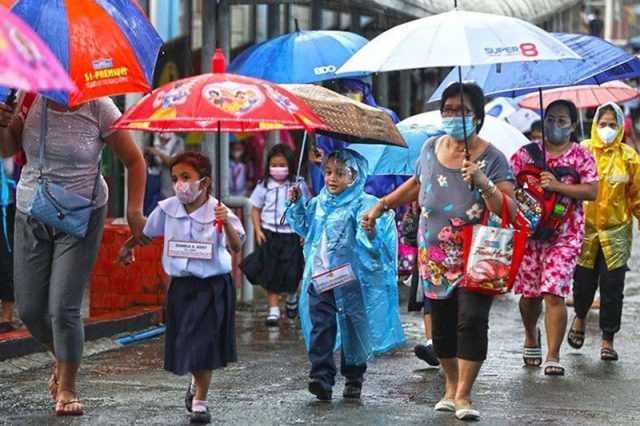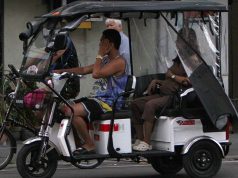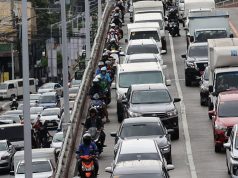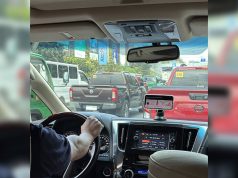
A columnist’s tweet about students waiting for class suspension announcements raised arguments about how different the circumstances surrounding the situation are now compared to before.
Technology news columnist Robert “Bob” Reyes compared today’s youth to that of his time. He claimed on Thursday that kids these days seem to be more interested in “#WalangPasok” announcements.
“Noong nag-aaral pa ako, ang inaantay namin ‘yung masarap na baon papasok ng paaralan. Ang mga kabataan ngayon, ang inaantay announcement ng #WalangPasok :-(,” he tweeted.

His tweet came after some local government units and local officials started to announce class suspensions on January 5 due to the inclement weather.
At that time, the country was dealing with two low pressure areas and the impacts of the northeast monsoon or “amihan.”
This resulted in heavy downpours of rain in several parts of the Philippines, including the populous Metro Manila which has low-lying areas prone to flooding.
There’s more to the ‘#WalangPasok’ announcement anticipation
Reyes’ tweet about class suspension gained traction and earned several reactions from Pinoys, with some countering his post.
A Filipino who claimed to have the responsibility and privilege of driving kids to school commented he would “rather have classes suspended as well” during that time.
The Twitter user cited “poor public planning,” “lack of a proper transportation system” and “constant flooding problems” as among the reasons for people seemingly preferring to have classes suspended instead.
Another user mentioned how challenging it is to commute nowadays, especially during inclement weather. Public transport fares have also since increased as a result of costlier petroleum products.
“Ang hirap po kasi bumayahe ngayon. As a kid, wala ko iniisip na bumayahe kasi may school service ako (crying face emoji). As an adult na mag-sho-shoulder lahat ng expense, ang hirap. Kagabi pa lang, gusto ko na maiyak sa presyo ng Grab. ‘Di naman makapag-Angkas kasi umuulan,” she wrote, citing ride-hailing apps.
Reyes responded to her by saying that people are lucky nowadays since there are available TNVS or transport network vehicle services where they can hail rides through apps. Similar to mass transport vehicles, ride-hailing services have also increased their fares.
“Noong nag-aaral ako (wala nang school bus/shuttle service), the only alternative sa jeepney ride ay maglakad o magtaxi (na hindi kaya ng allowance),” he tweeted.
Reyes also claimed that the flood in España, Manila is not as deep nowadays, compared to before when he said it was chest-level. The area is known for being easily flooded during rainy seasons.
The Twitter user responded to the columnist by saying she is not in España and then proceeded to mention that buses plying EDSA do not just stop anywhere nowadays.
“Pasay na ‘ko. ‘Di rin naman ako makapag-commute dahil ang bus ngayon hindi na humihinto sa Boni. Guadalupe na. ‘Di katulad before pandemic, may option ako mag-commute ‘pag walang ma-book,” she said.
Reyes acknowledged the change in the bus system along EDSA brought by the EDSA Bus Carousel.
The controversial tweet continued to earn comments from others who pointed out other differences surrounding class suspension circumstances compared to before.
A Twitter user shared that the traffic and transportation problem has since worsened in the country.
Last year, the city of Manila was ranked the eighth worst in the world in hours spent in traffic among global cities.
Another report recently ranked the Philippine capital’s public transportation and urban mobility as among the worst in the world.
“I experience the same way and yup, [noong] araw, kahit malakas ulan, pumapasok kami. Eh kasi wala [naman] ganito [katinding] baha [noon], wala [naman] ganito [katindi] na transport problem/traffic and ‘di po ganito [katindi] climate change… opo, [noong] araw kaya sana, alam [niyo] din pong mag-move on, charrr,” a Pinoy wrote in response to Reyes.
“Maybe because you are privileged??? Paano naman kaming hirap bumayahe or hirap pumasok sa school, ‘di ba? [You] don’t know how frustrating it is to pay P100 everyday sa fare and [for] byahe balikan, just to find out na walang klase upon arriving without notice. Siyempre mahahayok ka talaga sa announcement,” another Twitter user said.
Another Filipino shared a link to a report from the United Nations Development Programme on climate change and commented in response to Reyes’ original tweet:
“If we only recognize that the worsening societal conditions (which include the impacts of climate change) continue to undermine the quality and accessibility of education, that the youth should have in its optimal state. Yes, problems do worsen over time.”
If we only recognize that the worsening societal conditions (which include the impacts of climate change) continue to undermine the quality and accessibility of education, that the youth should have in its optimal state. Yes, problems do worsen over time.https://t.co/DQEwU9gXws https://t.co/kKjz7I1hIJ pic.twitter.com/tDJxAjB2Gy
— 𝕵.𝕬. #𝕯𝖊𝖛𝖊𝖑𝖔𝖕𝖒𝖊𝖓𝖙𝕱𝖔𝖗𝕬𝖑𝖑 (@jamontalbs) January 6, 2023
Developing countries like the Philippines have already been bearing the brunt of the worsening impacts of climate change such as storms, floods and droughts even though they have produced very little planet-warming emissions.
Meanwhile, another Twitter user mentioned typhoon PTSDs or post-traumatic stress disorders and how the country is always earning a global spotlight due to being severely impacted by such weather disturbances.
“SKL [share ko lang], typhoon PTSD and anxiety [have] been studied to be a common factor in [the] majority of Filipinos,” she wrote in response to Reyes’ tweet about class suspension.
“PH tops the global news [usually because] of massive deaths and damages from typhoons. Also, teenagers deserve to be safe from the elements, they deserve rest. Teenagers are kids, too,” the user added.
A psychology professor previously said that stress and anxiety are common psychological reactions to adverse events like typhoons.
A report said that doctors in the Eastern Visayas Regional Medical Center have seen rising cases of PTSD and depression in the ensuing years following the devastation of Super Typhoon Yolanda.
“There are still stories of children who burst into tears when it begins to rain,” journalist Jhesset Enano wrote in 2019.








